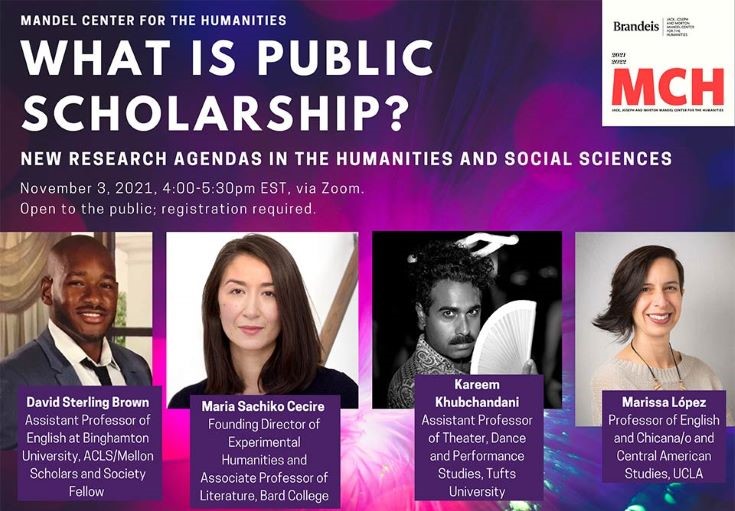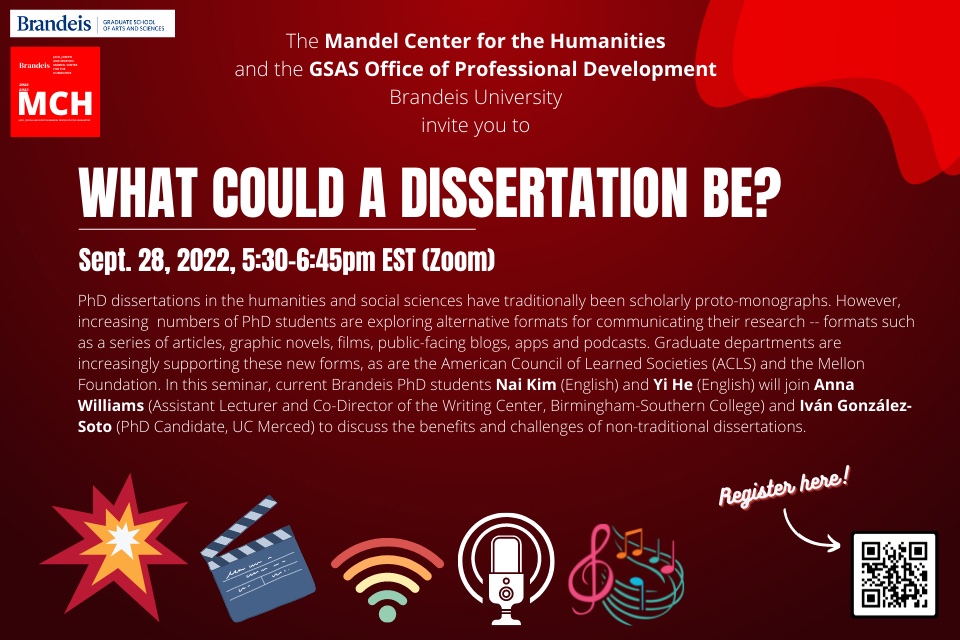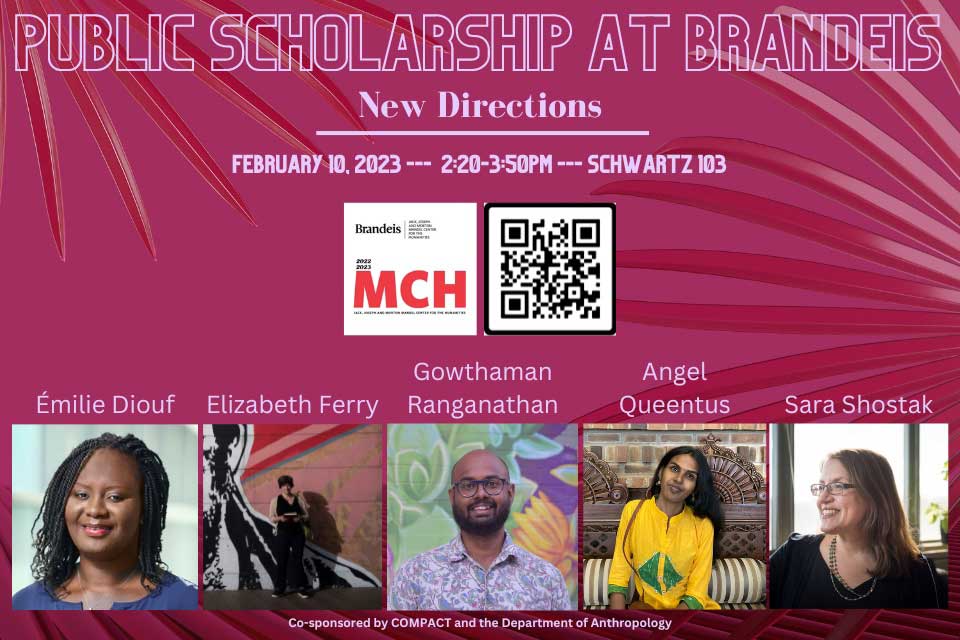Humanists at Work
Humanists at Work is a new series run by the Mandel Center for the Humanities that highlights the diverse kinds of work humanists and humanistic social scientists do in the world.
We aim to ask: What is humanistic research? What other kinds of research outputs can we imagine besides the traditional scholarly monograph? Who are our audiences? What is the potential social impact of humanistic and social scientific research? What kinds of connections can academics forge with communities, institutions and companies beyond the academy? What kind of careers are available to graduates of the humanities and the humanistic social sciences, both inside and outside the academy?
Upcoming Events
Stay tuned for our upcoming programming! To learn more about our projects click here.
Past Events

February 10, 2023
Speakers:
- Émilie Diouf, Assistant Professor of English
- Elizabeth Ferry, Professor of Anthropology
- Gowthaman Ranganathan, Graduate Student in Anthropology (with Angel Queentus)
- Sara Shostak, Professor of Sociology
September 28, 2022
PhD dissertations in the humanities and social sciences have traditionally been scholarly proto-monographs. However, increasing numbers of PhD students are exploring alternative formats for communicating their research — formats such as a series of articles, graphic novels, films, public-facing blogs, apps and podcasts. Graduate departments are increasingly supporting these new forms, as are the American Council of Learned Societies (ACLS) and the Mellon Foundation.
In this seminar, current Brandeis PhD students Nai Kim (English) and Yi He (English) joined Anna Williams (Assistant Lecturer and Co-Director of the Writing Center, Birmingham-Southern College) and Iván González-Soto (PhD Candidate, UC Merced) to discuss the benefits and challenges of non-traditional dissertations.

November 3, 2021
This panel was meant to initiate a discussion on our campus about the nature of public scholarship and to think more broadly about what research output might look like beyond the typical scholarly monograph. It is part of the MCH’s new focus on what kind of work counts as research, who our intended audiences are, the impact of humanistic research, and how we can think more broadly about what humanists and humanistic social scientists can do in the world.
Speakers:
David Sterling Brown — a Shakespeare and premodern critical race studies scholar — is assistant professor of English at Binghamton University and a current ACLS/Mellon Scholars and Society Fellow in residence with The Racial Imaginary Institute, founded by Claudia Rankine. Brown’s antiracist scholarship is published or forthcoming in "Radical Teacher, Shakespeare Bulletin, Shakespeare Studies, White People in Shakespeare, Hamlet: The State of Play, Los Angeles Review of Books" and other venues. His forthcoming book projects examine race and whiteness in Shakespearean drama.
Maria Sachiko Cecire is an associate professor of literature at Bard College, where she founded the academic program and Center for Experimental Humanities. She is the author of "Re-Enchanted: The Rise of Children's Fantasy Literature in the 20th Century" (2019) and is now working on an interdisciplinary project about the intellectual lives of so-called "at-risk" youth and their responses to young adult literature. She is on leave from Bard to serve as a program officer in the Higher Learning program at the Andrew W. Mellon Foundation.
Kareem Khubchandani is the Mellon Bridge assistant professor in theater, dance and performance studies, and women's, gender, and sexuality studies at Tufts University. He is the author of "Ishtyle: Accenting Gay Indian Nightlife" (University of Michigan Press, 2020), which won the 2021 Association for Theatre in Higher Education Outstanding Book award, 2021 Dance Studies Association de la Torre Bueno book award, and the 2019 CLAGS: Center for LGBTQ Studies Fellowship. Kareem is also co-editor of "Queer Nightlife" (University of Michigan Press, 2021) and curator of criticalauntystudies.com.
Marissa López is a professor of English and Chicana/o and Central American studies at UCLA, researching Chicanx literature from the 19th century to the present. She is the author of "Chicano Nations" (NYU 2011) and "Racial Immanence" (NYU 2019), and in 2020 served as a Scholar in Residence at the Los Angeles Public Library with whom she is collaborating to develop a mobile app, "Picturing Mexican America," that uses geodata to display images of Mexican California to users.
Watch the recording of the event here (click on the full screen icon for larger size):
September 23, 2021
On Thursday, Sept. 23, Dr. Leonard Cassuto, professor of English at Fordham University and the author of "The New PhD: How to Build a Better Graduate Education" who also writes the graduate advisor column for The Chronicle of Higher Education, gave the opening lecture for this year's programming at the MCH.
His talk, "Rethinking the Humanities in Trying Times," argued that graduate education was already in trouble even before the recent pandemic. Making the case for a more student-centered approach to graduate education, Dr. Cassuto highlighted the fact that humanities graduate education focuses on training students for only one type of job — tenure-track professor at a research institution — even though only a very small minority of students will get that job.
Dr. Cassuto put forth concrete suggestions for revitalizing the humanities PhD, such as encouraging public scholarship, focusing on professional skills that transfer to more than one type of job, and reducing the time it takes students to earn a degree in order to make graduate education more relevant and helpful to students who enter a diverse job market. His talk helped the audience reevaluate how they see humanities work in their own departments and to imagine new ways that humanistic thinking can be used in the world.
September 17, 2021
For this pilot program, the Mandel Center for the Humanities collaborated with the Graduate School of Arts and Sciences to fund 10 PhD students in the humanities, social sciences and arts to take a 10-week course at the Rabb School of Continuing Studies. This skills-oriented course is intended to complement PhD training and widen career options. As part of the funding, students will meet together as a cohort and write a short essay about how the course contributed to their professional goals.

